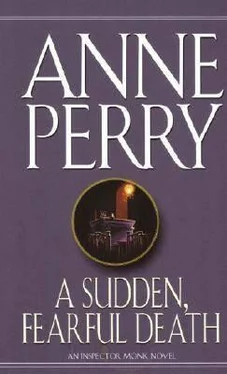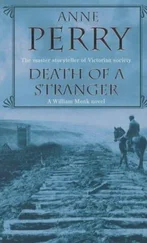"Tell me," Edith said again, "everything that is fun and interesting and that you care about since we last met."
Hester wriggled a little farther down in her chair and began.
At about the same time that Hester was enjoying her tea and cucumber sandwiches with Edith and the major, Callandra was picking up a very elegant wafer-thin finger of bread and butter at the garden party of Lady Stanhope. She was not fond of garden parties, still less of the sort of people who usually attended them, but she had come because she wanted to meet the daughter that Hester had told her Sir Herbert had spoken of, the one maimed for life by the bungled abortion. Even thinking of it chilled her so deeply she felt a little sick.
All around her were the sounds of tinkling cups and glasses, murmured conversation, laughter, the swish and rustle of skirts. Footmen moved discreetly among the guests with fresh bottles of chilled champagne or tall glasses of iced lemonade. Maids in crisp lace aprons and starched caps offered trays of sandwiches and tiny pastries or cakes. A titled lady made a joke, and everyone around her laughed. Heads turned.
It had not been easy to obtain an invitation. She was not acquainted with Lady Stanhope, who was a quiet woman better pleased to remain at home with her seven children than involve herself in public affairs, and entered society only as much as was required of her to maintain her husband's standing, and not to find herself remarked upon. This garden party was a way of discharging a great many of her obligations in one event, and she was not totally conversant with her guest list. Consequently she had not seemed surprised to meet Callandra. Perhaps she supposed her to be someone whose hospitality she had accepted without remembering, and whom she had invited in order to cancel a debt.
Callandra had actually come in the company of a mutual friend, upon whom she felt quite free to call for a favor without any detail of explanation.
She'd had to dress far more formally than she enjoyed. Her maid, a most comfortable and agreeable creature who had worked for her for years, had always found hair difficult and possessed little natural art with it. On the other hand, she was extremely good-tempered, had excellent health, a pleasing sense of humor, and was supremely loyal. Since Callandra seldom cared in the slightest what her hair looked like, these virtues far outweighed her failings.
However, today it would have been appreciated had she had skill with the comb and pin. Instead, Callandra looked as if she had ridden to the event at a gallop, and every time she put her hand up to tidy away a stray strand, she made it worse and (if such a thing were possible) drew more attention to it.
She was dressed in a medium shade of blue, trimmed with white. It was not especially fashionable, but it was most becoming, and that, at her age, mattered far more.
She was not really sure what she hoped to achieve. Even in the most fluent and companionable conversation with Victoria Stanhope, should she contrive such a thing, she could hardly ask her who had operated on her so tragically, nor what money he had taken from her for the act-one could hardly call it a service.
She was standing at the edge of the lawn, next to the herbaceous border, which was now filled with soaring delphiniums, blazing peonies, rather overblown poppies, and some blue veronica and catmint which smelled delicious. She felt miserable, out of place, and extremely foolish. It was quite pointless to have come, and she was on the edge of looking for some socially acceptable excuse to leave when she was engaged in conversation by an elderly gentleman who was determined to explain to her his theories on the propagation of pinks, and assure that she understood precisely how to instruct her gardener in the matter of cuttings.
Three times she tried to persuade him that her gardener was quite skilled in the art, but his enthusiasm overrode all she could do, and it was a quarter of an hour later when she finally extricated herself and found herself face to face with young Arthur Stanhope, Sir Herbert's eldest son. He was a slender young man with a pale complexion and smooth brown hair. He was about nineteen and very obviously doing his duty at his mother's party. It would have been heartless to dismiss him. The only decent thing was to answer all his polite questions and try to keep her mind on the totally meaningless conversation.
She was saying yes and no at what she hoped were appropriate junctures when she became aware of a girl of about seventeen hovering a few yards away. She was very thin and seemed to stand almost lopsidedly, as if she might walk with a limp. Her dress was a pretty blush pink, and very well cut, but all the dressmaker's skill could not hide the drawn look on her face nor the smudges of tiredness under her eyes. Callandra had seen too many invalids not to recognize the signs of pain when she saw them so clearly, or the attitude of one who finds standing tiring.
"Excuse me," she said, interrupting Arthur without a thought.
"Eh?" He looked startled. "Yes?"
"I think the young lady is waiting for you." She indicated the girl in pink.
He turned around to follow her gaze. A mixture of emotions filled his face-discomfort, defensiveness, irritation, and tenderness.
"Oh-yes, Victoria, do come and meet Lady Callandra Daviot."
Victoria hesitated; now that attention was drawn to her, she was self-conscious.
Callandra knew what life lay ahead for a girl who could not ever hope to marry. She would be permanently dependent upon her father for financial support, and upon her mother for companionship and affection. She would never have a home of her own, unless she were an only child of wealthy parents, which Victoria was not. Arthur would naturally inherit the estate, apart from a suitable dowry for his marriageable sisters. His brothers would make their own way, having been given appropriate education and a handsome start.
For Victoria, by far the most consistently painful thing would be the pity, the well-meaning and desperately cruel remarks, the unthinking questions, the young men who paid her court-until they knew.
With an ache inside her that was almost intolerable, Callandra smiled at the girl.
"How do you do, Miss Stanhope," she said with all the charm she could muster, which was far more than she realized.
"How do you do, Lady Callandra," Victoria said with a hesitant smile in answer.
"What a delightful garden you have," Callandra went on. Not only was she considerably the elder, and therefore it was incumbent upon her to lead the conversation, it was quite apparent that Victoria found it hard to accomplish what duty required, and did not enjoy it. Social awkwardness was a pinprick compared with the mortal wound that had already been dealt her, but at that moment Callandra would have spared her even the thought of pain, much less its reality. "I see you have several fine pinks as well. I love the perfume of them, don't you?" She saw Victoria's answering smile. "A gentleman with an eyeglass was just explaining to me how they are propagated to cross one strain with another."
"Oh yes-Colonel Strother," Victoria said quickly, taking a step closer. "I'm afraid he does tend to elaborate on the subject rather."
"Just a little," Callandra conceded. "Still, it is a pleasant enough thing to discuss, and I daresay he meant it kindly."
"I had rather listen to Colonel Strother on pinks than Mrs. Warburton on immorality in garrison towns." Victoria smiled a little. "Or Mrs. Peabody on her health, or Mrs. Kilbride on the state of the cotton industry in the plantations of America, or Major Drissell on the Indian mutiny." Her enthusiasm grew with a sense of ease with Callandra. "We get the massacre at Amritsar every time he calls. I have even had it served up with fish at dinner, and again with the sorbet."
Читать дальше












